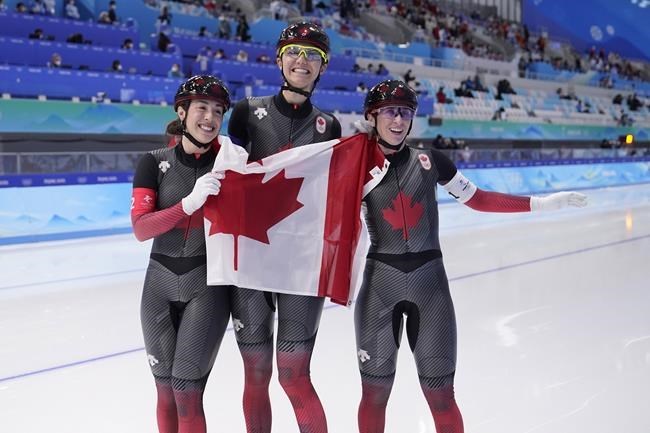CALGARY — After an Olympic gold medal, going where no team as gone before drives Isabelle Weidemann, Ivanie Blondin and Valérie Maltais.
The trio captured gold in women's speedskating team pursuit in Beijing in February after four years of making the event a priority in their training.
Canadian women have a strong history in the six-lap race, which features two teams of three racing both the clock and each other, but Ottawa's Weidemann and Blondin and Maltais of La Baie, Que., are Canada's first Olympic champions in it.
Reclaiming a world record for Canada is the next carrot the trio will chase.
"We always have our eyes set on the world record," Weidemann told The Canadian Press. "We want to put our names in that record book. If that isn't in the cards for us, at least we're going to finish this team pursuit, this legacy, just trying to do that."
They'll compete in team pursuit Saturday in Calgary in the first of back-to-back World Cups at the Olympic Oval.
Racing starts Friday and concludes Sunday followed Dec. 16-18 by another three-day World Cup at the oval.
"The only thing that we haven't accomplished as a team is that world record," Blondin said. "That's definitely a goal of ours. It would be cool for sure to do it on home ice."
The current record is two minutes 50.76 seconds set by Japan's Ayano Sato, Miho Tagaki and Nana Tagaki in Salt Lake City in 2020.
Weidemann, Blondin and Maltais beat that trio for gold in Beijing — Nana Tagaki fell on the final lap — in an Olympic-record time of 2:53.44.
The Japanese have held and lowered the world record since 2017, when they bettered the eight-year-old mark of 2.55.79 set by Canada's Kristina Groves, Brittany Schussler and Christine Nesbitt in 2009.
While both Calgary and Salt Lake vie for the title of fastest ice in the world because of aridness and altitude, many elements have to align to set a new world mark, including air pressure in the building that can be dictated by the weather outside, said Blondin.
"There's less turbulence when the air pressure is really low, and it just gets so much faster," she said.
Remaining atop the podium this season in the face of constant challenges from Japan and the Netherlands will test the Canadians.
Weidemann, Blondin and Maltais opened the season with a victory in Stavanger, Norway.
"We always have raced with this idea that we're not number one, we're always going to get beat," Weidemann said. "I like that kind of idea on the team. When we go to line we're like 'we can get beat today.' It is always a possibility in long-track speedskating."
It's unusual for Calgary to host a pair of speedskating World Cups in a single season, although Tomaszów Mazowiecki, Poland will do the same in February.
"I think part of it is the ISU's mission to manage travel budgets and travel costs for a lot of countries," said Speedskating Canada long-track high-performance director Mark Wild.
"When you're travelling to multiple World Cups throughout the season, it's pretty hard on the budget, especially with the cost of airline travel now."
Blondin, an Olympic silver medallist in women's mass start, races the event both weekends in Calgary.
Weidemann will compete in the 3,000 metres Friday after taking Olympic bronze in it, followed by next week's 5k in which she earned silver in Beijing.
World champion sprinter Laurent Dubreuil of Laval, Que., races the men's 500 and 1,000 metres on back-to-back weekends.
The 30-year-old won last season's World Cup crown in the 500 and tops the standings again after two races this season. Dubreuil also earned a 1,000-metre silver medal in Beijing.
Connor Howe of Canmore, Alta., is this season's front-runner in the men's 1,500 metres after a victory and a runner-up result.
Calgary's Ted-Jan Bloemen, the 2018 Olympic champion in the 10,000 metres and silver medallist in the 5k, starts his World Cup season in Calgary.
He sat out the first two stops for the birth of his son.
As the host country, Canada can ice a full quota of skaters with up to five entries in some distances.
"The opportunity to max out our team size is really advantageous to us," Wild said. "We're targeting podium performances for our athletes."
This report by The Canadian Press was first published Dec. 8, 2022.
Donna Spencer, The Canadian Press


